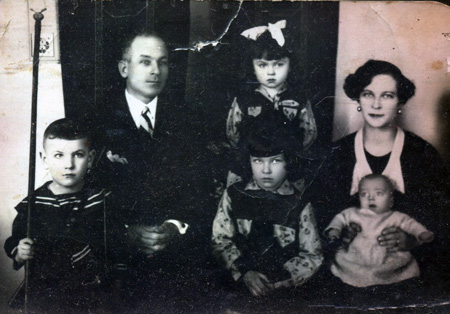
The family before World War II
Before the war, Halina Babinska lived in Zdolbunow, in Wołyń, where she attended a public school together with Polish, Jewish and Ukrainian pupils, though there was also a state-supported Jewish, Ukrainian and Czech school. There were a few other smaller communities, among them German.
Her father, originally from Kiev, returned to Poland after the revolution. In 1939 he was a municipal employee and a reservist, and was mobilized a couple of months before the outbreak of war. He returned home after capitulation and was arrested by the NKVD, in the middle of the night – as was their method – in late 1939.
The frightened family remained in the home, despite warnings that they were at risk. But, with eastern Poland occupied by the USSR and western Poland by Germany, there were no easy options. In April 1940, the NKVD came back, again in the middle of the night. At gunpoint they were given an hour to pack. Halina wanted to take a book, Quo Vadis, that she had just got for her 10th birthday, but the NKVD took it away. And so began their long journey, first in large horse-drawn wagons, then in freight cars.
After the three weeks journey the prisoners arrived in North Kazakhstan exhausted, weakened and, many of them, ill. Some had died along the way. They were told they were now in their new settlement – but there was nothing there, just a vast steppe. Halina’s mother and another woman built a makeshift shelter out of anything they could find and searched for food, berries and other greens that could be edible. Halina’s father was still in prison somewhere.
Some 20 kilometres away there was a collective farm, so Halina’s mother went to work in grain elevators there, leaving Halina to look after her younger siblings on the bleak, isolated steppe. But at least she could bring back food once a week. As winter approached, she arranged for the children to be moved to Karaguga, a small town nearby, because they would not have survived the winter.
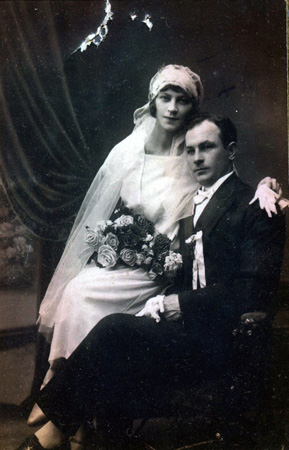
Halina’s parents
There they heard about the amnesty, a word that implied they were pardoned for some crime. Still, it promised freedom. They heard about the formation of a Polish army and left looking for the Polish 5th infantry division. They had very little to take with them but did pack a blue enamelled pail and a bottle, which proved to be lifesaving, first as a container for the food they scavenged and later because they were able to sell them.
Thousands of released Polish prisoners were streaming south, a tsunami of misery. There was no schedule for trains. One could wait for days, only to miss a train simply by being away while looking for food. Halina’s mother wanted to find a village for the winter but Halina stubbornly insisted they keep going.
Suddenly, their father, also released from a camp, located them. By then already with the army, he obtained documents for them. There were many more obstacles to overcome but they finally reached Krasnovodsk, on the Caspian Sea, from where they would board ships for Persia. But there, her father and brother got typhus. Her father died. Halina, aged 11, was told but was asked not to tell her mother who was already in a weak condition. If she had to leave her son, she had to believe she was leaving him with his father.
They boarded a boat for the crossing to Pahlavi. These ships were cargo vessels, dangerously overcrowded and with no sanitary facilities. People got sick, adding to the stench and filth.
The ships dropped anchor some distance from shore, the weary passengers transferred to small boats. Once ashore, they staggered towards a disinfection centre where all their clothes had to be either sterilized or completely burnt and new ones issued. Halina tried to support her mother, but her mother collapsed, first to her knees, then fell to the ground and died, in front of her daughters.
Arrangements were then made to get the three girls into an orphanage. Halina refused to go, insisting that she was now “mother” to her sisters, as she had done so many times before. She was treated kindly, with understanding. Assured that she would not be forced into the orphanage, she was encouraged to at least go and see the place. By this time, her youngest sister got sick so Halina agreed to look, still insisting she would not stay in an orphanage! But when she got there, she was greeted with such warmth and kindness by the girls already there, that she agreed to stay at least for a while. Some soldiers were sent to get her sisters and there they remained. The atmosphere was more like a boarding school than an orphanage – or so Halina thought – and there was a kind of solidarity, an egalitarianism, a feeling of family.
From Pahlavi, the children were taken to Teheran and then to Isfahan. Halina was by then quite happy but still rebellious – refusing to have her hair cut though that was regulation because of lice. But there was never any harsh discipline,
Today, she marvels at the enlightened policies for the treatment of these traumatized children. The caregivers were very patient and understanding. A few of the less important ones who just gave routine care were not great – though some of the cooks, and cleaners were also warm and loving women. But the teachers, psychologists, and doctors who set the rules had an approach that was one of restoring the children to health, both physical and emotional – not disciplining them into obedience. The Polish social services treated the plight of the children as a national tragedy, and restoring them to health was both a matter of personal recovery and national recovery. They were treasures, to be treasured. The schools did have rules, but the rules applied to the environment, not to individual children, whose personalities, cares and sorrows were all respected. They were treated with dignity, made to feel they were important, that their lives were important. Little by little, the rebellious, depressed, foul-mouthed, cynical children turned into responsible fun-loving youth.
For Halina, the orphanage in Isfahan provided her with excellent schooling, and gave her a new family that she came to love and with whom she maintained contact the rest of her life. When large transports of orphans, mostly younger children, left for New Zealand and Africa, Halina refused to go. Again, the caregivers took her feelings into consideration and she was allowed to stay – and keep her younger sisters with her. After a few months, her brother, having survived typhus, was also evacuated from Uzbekistan and brought to Isfahan. But eventually the older children had to leave this beautiful Persian city and were transferred to Lebanon.
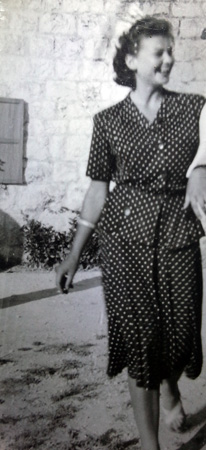
Halina in Beirut shortly before leaving for Canada
There, Halina was finally separated from her siblings; she continued her studies in Beirut, her younger sisters enrolled in a boarding school nearby, and her brother in an academy run by the Polish army. She was completely on her own, managing her meagre government allowance to pay room and board and sundry expenses
After the war, when the IRO (International Refugee Organization) got involved in resettling the refugees, Halina and her sisters had a serious problem. The British would only accept families of the men in the army under their command. Other countries, such as Canada and Australia, wanted workers, not dependents. So the girls were strongly urged to return to Poland. This was impossible. After their Soviet experience, Halina adamantly refused to go to a communist country.
Australia was the first possibility but Halina, still dreaming of returning home to Poland, thought that was too far. Then she was interviewed by a Canadian immigration official, a Mr. Johnson.* He informed her that Canada only wanted to accept adult women as domestic help, or men to work on farms, in forests or in mines, and she, almost 18, was too young. (The age of majority at the time was 21.) Her sisters, only 16 and 12, were totally too young. He was willing to make an exception for her but not for her sisters. In a fury, Halina raged at him, calling him insensitive and worse. Could he not see that after all they had lost it was inhuman to suggest that she abandon her younger sisters? They were all the family they had. Their brother was in England, taken care of by the army, but the girls had nothing. Mr. Johnson was angry too, at first, but he was also impressed by the young woman’s passion and determination. His impatience turned into understanding. He agreed to approve both Halina and 16-year old Danka to come to Canada to work as domestics, and the youngest girl as Halina’s dependent.
When Halina boarded the ship for the long journey to Canada, Mr. Johnson was on the same ship, returning to his work in Europe. They met on board, and often spoke. Then he disembarked in Naples and she continued to Canada, a mother to her younger siblings. They corresponded for a while. Then the letters stopped.
In Canada, she worked as a live-in maid in Beaconsfield, a suburb of Montreal, after persuading the family that her younger sister had to live with her and attend school. About a year later, Halina married a Polish refugee, an engineer, who had spent almost five years in the Sachsenhausen concentration camp in Germany. Together, their experiences under the combined German-Soviet occupations of Poland encapsulate the story of the Polish wartime experience.
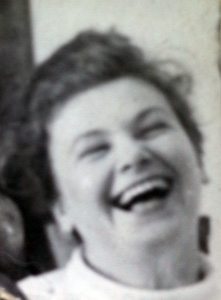
Halina: There’s that Indomitable Spirit
After her marriage, she continued caring for her younger sister, ensuring her education while resuming her own. She had children, and later worked in the social services section of the Queen Elizabeth Hospital in Montreal, where her command of several languages was a great asset. Her brother finished his studies in electrical engineering in England, and joined them in Canada in the 1950s.
The good Mr. Johnson returned to Canada in the early 1950s, to Montreal, and found Halina. It was too late. She was married. He has always been fondly remembered as the understanding man who broke the rules out of the kindness of his heart.
CR
* The official’s name has been changed.
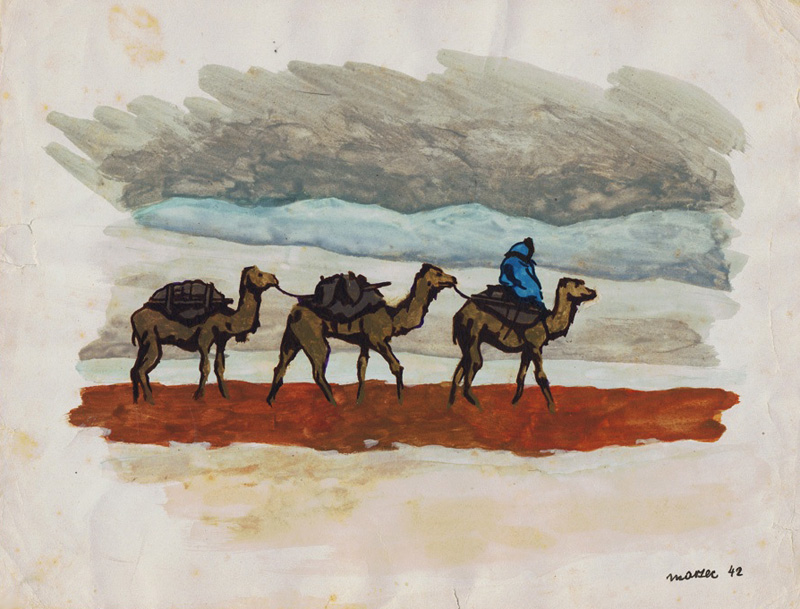



Pingback: February 1940: Exile, Odyssey, Redemption